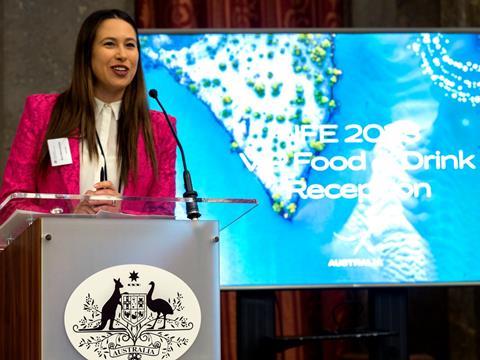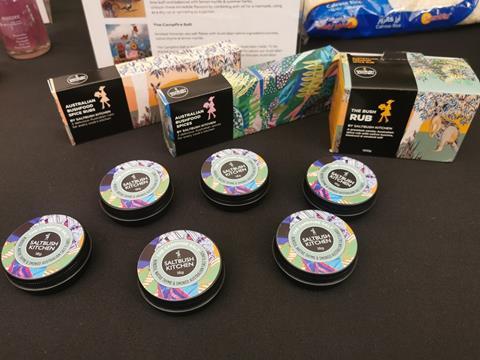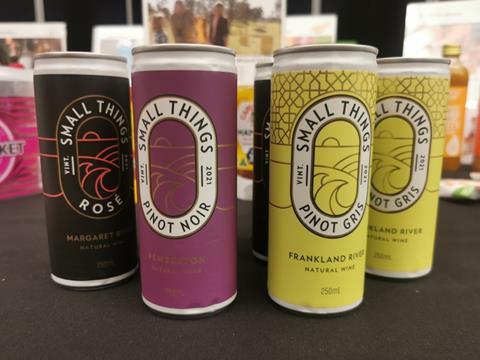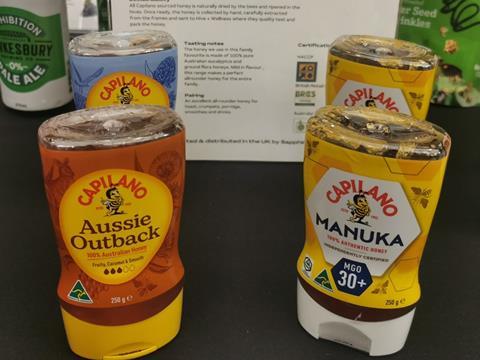
Earlier this year, Austrade and the Australian High Commission held a VIP Food and Drink Event at Australia House in London, showcasing Australian food and drink products ahead of the UK-Australia Free Trade Agreement coming into force on the 31st of May.
Junior journalist Frances Butler attended to find out more about the packaging considerations and challenges of transporting products long distances from Australia to the UK and the similarities and differences between the sustainability goals and regulations in both countries.
The event’s opening speech came from deputy high commissioner to the UK Elisabeth Bowes, who began by acknowledging “our First Nations people, the Aboriginal and Torres Strait Islander people and their connection to land, sea and community”, and added there were “samples of the land and sea” available that evening. She highlighted the use of ingredients and flavours specific to Australia, such as Saltbush Kitchen’s spices which use indigenous ingredients “which cannot be found anywhere else outside of Australia” and Manuka and Jarrah honeys collected from native Australian plants and flowers.
As chief negotiator of the Australia-UK Free Trade Agreement, Bowes stated “we are on the cusp of entry into force”, with one of the key aims to ensure consumers in the UK can benefit from new and expanded market access for produce which will enter onto the Australian market – but also for Australian consumers to take advantage of the UK exporters’ produce and products.
She added that with [around] half of the food consumed in the UK being imported (in 2020, the UK reportedly imported 46% of the food it consumed), Australia can offer industry processors and consumers an alternative reliable source of sustainable, high quality products to meet the year-round demand. She also drew attention to the Australian toothfish supplied by Austral Fisheries, allegedly the first seafood company to be certified as carbon neutral in 2016.

During the event, various food and drink products were displayed on tables within Australia House with hall and stand information for the International Food and Drink Event (IFE) also taking place in London at the time. Fourth Wave Wine’s Tread Softly products were featured at the event; we spoke to head of UK and Ireland Max Lloyd about the company’s labelling process, plans for the UK market and sustainability goals.
Lloyd stated that the company’s labels don’t use ink or embossing – “we use labels that are 100% biodegradable or made from organic materials” with the glues also being biodegradable. He highlighted what is apparently the “first label-less wine”, the company’s new ‘Crate’ products:
“All the information is on a QR code on the neck of the bottle. There’s no tasting notes, no front label or back label. Within our Crate concepts we do ‘back in box’ – it’s all brown cardboard with black ink, no colours.”
When transporting products from Australia to the UK, the main consideration in terms of packaging is having the right information on the products to hit UK government guidelines and the right import data, Lloyd said. With crates and the labelling on the neck “there are ways to have the right message and what we’re doing is sustainably correct, but we’ve still got to adhere to the information to get through customs, excises and duty.”
Lloyd added that there are some similarities between sustainability goals in the UK and Australia: “to call a wine ‘organic’, we have to agree what is organic in the UK and back home. Australia can’t suddenly have a different organic law to the UK, we have to be able to say that organic produce has the same level of quality.
Whether it’s biodynamic, organic, vegan friendly – we’ve got to adhere to the same elements of that. There are also alcohol laws – we have to make sure we stick to the guidance laws in the UK for alcohol tolerances and responsible drinking.”
When asked what the main challenges are when transporting products long distances from Australia to the UK, Lloyd replied:
“Transportation over long distances all comes down to weight. Long distance ships are highly efficient for what we do if we can get things into mass containers. We also do cans – you can get way more volume into a container in a can, so we will go into the ‘back in box’ and can format where we can, to get the glass off the boats.”
He added the company’s long-term aim is to transport with bladders, bottle in the UK and eventually have wine in kegs for dispensing, removing packaging altogether.

Other companies featured at the event included Saltbush Kitchen which offers refills for its salt, spices and spice rubs in an effort to reduce the amount of packaging in repeat purchases; Small Things Wine which packages its wine in cans; and Capilano Honey which has reduced the amount of plastic in its products in recent years.
We then spoke to managing director Ian Food and account manager Rebecca Food from food importing and distribution business Sapphire Brands about introducing Australian food into the UK market, transport challenges and the differences in packaging and labelling between the two countries.
Ian explained one of the challenges for introducing Australian food to the market is that “you’re bringing a product 10,000 miles across the sea; the cost of living is higher in Australia so the price of foodstuff is at least 10% more; and you’re trying to introduce that to a very price sensitive market.”
He added that companies tailor their packaging to appeal to the UK market, such as Capilano Honey who introduced designs featuring Australian animals on the pack. “A lot of people see Australia as kangaroos, koalas and Crocodile Dundee – but there’s a romantic feeling about it. Capilano Honey completely changed their packaging to represent the romance of the Australian outback with ‘Aussie Outback Honey’.”

When asked about the differences between sustainability goals and regulations in the two countries, Ian mentioned some compliance issues with labels, and added:
“Wherever possible we try to get bespoke labelling and packaging for the UK. Anything from outside of the EU still needs to have UK distributor details on for trading standards, and the Australian nutritional panel is slightly different to the UK. With allergens, some of them are not as ‘bolded’ as they should be.”
He stated that sustainability is constant message when bringing in products from so far away. Aiming to remove the negative aspects of this, the company apparently planted a few acres of willow in its land to offset its carbon footprint which is “probably the main obstacle we face”, according to Ian.
However, he also pointed out shipping costs as a major challenge, alleging that “it trebled last year, but thankfully the Australian costs have just come back down. It went from 5,000 pounds [to ship] a refrigerated container from Brisbane in Australia to Leicestershire in the UK up to 15,000.”
The VIP Food and Drink event is not the first time Packaging Europe has connected with Austrade – back in November 2022 we spoke to trade commissioner for the UK and Ireland Ana Nishnianidze about the potential effects of the Free Trade Agreement on the industry and Australian packaging trends; and the following month we interviewed Small Things Wine regarding its canned wines, recyclability and the manufacturing process.














No comments yet